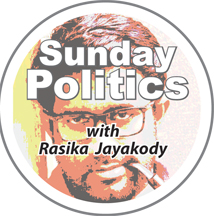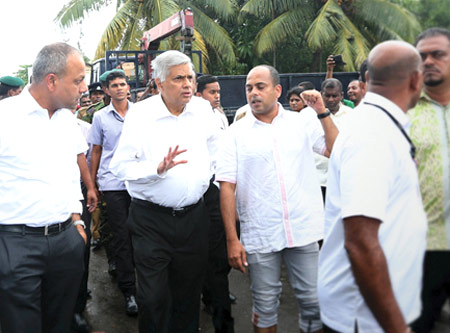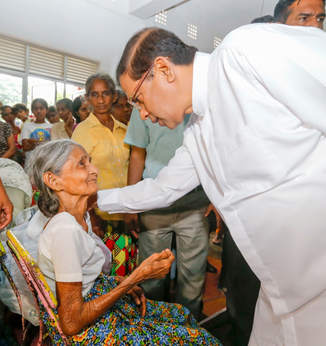|
Civil society groups demand quick action :
Cabinet defers paper on anti-corruption delays

The country’s political sphere and its developments were eclipsed by a massive
natural disaster this week, which rendered over 200,000 people temporarily
homeless, leaving nearly 60 dead and hundreds missing.
This was the largest natural disaster to hit the country after the tsunami,
which rocked the nation nearly 12 years ago.
 Although the proportion of the damage could not be compared with that of the
tsunami, it affected hundreds of thousands of people in many districts,
including the capital city of Colombo. Some people were stranded in their houses
for over three days without any access to the most essential needs such as food
and drinking water. Although the proportion of the damage could not be compared with that of the
tsunami, it affected hundreds of thousands of people in many districts,
including the capital city of Colombo. Some people were stranded in their houses
for over three days without any access to the most essential needs such as food
and drinking water.
This situation compelled politicians to move out of their cozy office rooms and
work laboriously with relief workers on the ground. The Parliamentary sessions
were adjourned on Thursday, allowing Parliamentarians to visit flood-affected
areas and help victims.
President MaithripalaSirisena, on Wednesday morning, visited the Aranayake area
where three villages got buried following a massive landslide.
The President went to the Samasarakanda area where rescue teams of security
forces were carrying out their missions. Despite incessant rain, they worked
hard to recover the bodies of villagers, fighting large swathes of mud,
engulfing the area
After ‘Sasara Kanda’, the President visited Siripura and Pallebage - two other
adjacent villages affected by landslides. The majority of residents of the two
villages had gathered at safe places and the President looked into their
conditions and facilities.
He then left for the Dikpitiya Rajagiriya Vidyalaya in Aranayake and the
Hathgampala Vidyalaya where a large number of people had taken refuge.
The President instructed all public officials to attend to their needs and
expedite relief work. To facilitate the process, the government also took speedy
measures to cancel leave for all state sector workers, until further notice.
Politicians active
|

Prime Minister Ranil Wickremesinghe in Wellampitiya |
While the President was in the Kegalle district, Prime Minister Ranil
Wickremesinghe was in the Wellampitiya area, visiting flood victims and
monitoring the progress of relief operations.
Minister Sagala Ratnayaka, Parliamentarian S.M. Marikkar and former
Parliamentarian Rosy Senanayake joined the Prime Minister.
Several politicians representing the Colombo district were seen actively
involved in flood relief programs. Some politicians of the government, however,
had to deal with angry flood victims when they visited flood-fit areas on
Thursday.
Minister Rauff Hakeem and Western Province Chief Minister Isura Devapriya faced
resistance when they visited flood victims in the Colombo district on Thursday
morning.
It was quite evident that the two ministers had to ‘take the bullet’ for the
entire government, from angry flood victims. The two politicians took it on the
chin, and proceeded with their inspection tour, without attempting to respond to
angry residents.
The JVP MPs too, under their social welfare arm ‘RathuTharuwa’, initiated an
efficient campaign to rescue flood victims and distribute flood donations. JVP
stalwarts namely K.D. Lalkantha, Sunil Handunnetti and BimalRatnayaka were seen
actively involved in the relief missions.
Some of the JVP MPs were seen engaging rescue operations, working with relief
workers and volunteers. Many commended the JVP’s initiative saying it was the
most hands-on relief program launched by a political party.
However, some relief workers attached to the JVP were seen wearing T-shirts
bearing the party’s symbol and it marred the magnanimity of the initiative – at
least in the eyes of some.
Interestingly, initiatives launched by ordinary citizens, who maintained their
network through social media, were much more efficient than those of the
government. Office workers collected lunch packets at railway stations in
Colombo and distributed them among flood victims.
Various civil groups worked hand in hand with rescue teams and provided them
with manpower. There was no central authority to drive and regulate the relief
work, but the citizens, collectively, rose up to the challenge.
Many supermarkets, in and around Colombo, ran out of food and sanitary items as
people, from all walks of life, bought them in large stocks over the past four
days.
It also highlighted the fact that the citizens’ initiatives were way ahead of
mechanism adopted by the state bodies such as divisional and district
secretariats to distribute flood donations. Some relief programs launched by
divisional secretariats in the Colombo district, did not function after office
hours!
Heated Cabinet meeting
It was against this backdrop that the President chaired the weekly Cabinet
meeting at the Presidential Secretariat on Tuesday morning. Despite the
torrential downpour, the Cabinet meeting was heated over a controversial joint
Cabinet paper, presented by four ministers of the national unity government –
namely Rajitha Senaratne, Patali Champika Ranawaka, Sarath Fonseka and Arjuna
Ranatunga.
The salient points of the joint cabinet paper were:
|

President Maithripala Sirisena comforts a victim of the
landslide at Aranayaka |
“1) On January 08, 2015, the people of the country voted for a new President and
a new government with the aim of establishing rule of law, curbing bribery and
corruption, establishing democracy, justice and equality.
2) Such aspirations of the people were reiterated at the Parliamentary election
on August 17, 2015.
3) Although 16 months have elapsed after the establishment of the good
governance government, the public still has doubts over the government’s will to
fulfill their expectations in terms of battling bribery and corruption.
4) Law enforcement bodies have failed to conclude investigations into
large-scale bribery and corruption allegations leveled against top-brass members
of the previous regime. We were the ones who convinced the public that the
previous administration was corrupt to the core. Unfortunately, under our own
administration, we have failed to file action against those who were heavily
involved in bribery and corruption under the previous regime.
5) As a result, the public is now under the impression that the present
government too endorses the alleged acts of corruption committed by some members
of the previous regime. This also gives rise to the speculation that the present
administration has no qualms about ‘cooperating’ and hobnobbing with corrupt
elements linked with the previous administration. The civil society groups now
claim that the battle against corruption is corrupt!
6) Secondly, the law enforcement mechanism’s inaction leads to the speculation
that we resorted to lies and unsubstantiated allegations during our campaign to
topple the previous regime. This challenges the ‘ideological base’ of the
current government.
7) Thirdly, this will play into the hands of those who claim that the
government’s battle against corruption is an act of political revenge. Even at
this point, the most vociferous campaigners against the government are the ones
who are directly responsible for large-scale corrupt deals and misappropriation.
This allows them to dub any anti-corruption investigation as a revengeful act
against their so-called political activism.
8) At the same time, this lethargic approach may plunge the genuine supporters
of the government into an embarrassing situation. It will also bring their
public image and reputation into question.
If the present trend continues, it will turn the collective action against
corruption before the last Presidential election into a farce.
9) It is all too evident that, during the period between 2013 and 2014, the
economic growth of the country was ‘concentrated’ in the hands of a few powerful
figures.Recent international statistics have pointed out that the country has
lost nearly USD 20 billion as a result of illegal money transactions. The
current government is burdened with their sins and the government makes tough
decisions to deal with this situation, it, in return, affects the popularity of
the government.
10) It is farcical that those who were instrumental in creating this precarious
economic situation are now shedding crocodile tears about the people’s tax
burden!
11) We should admit that the meticulous manner in which the top-notch members of
the previous carried out their acts of corruption had complicated the
investigation process. As a result of this understanding, Minister Patali
Champika Ranawaka, on January 21, 2015, presented a Cabinet paper to set up a
special tribunal in line with the UN anti-corruption charter. We regretfully
inform you that none of its proposals materialised on the ground.
Therefore,
* The Cabinet of ministers requests details and follow-up action on every
complaint lodged by the civil society groups with various government bodies
looking into bribery and corruption. We also wish to know the legal status and
background relating to the progress of those investigations.
* The cabinet of also requests details about the progress of the work carried
out by the institutions attached to the Sri Lanka Police and other other
commissions, including the Presidential Commission.
* The cabinet requests details about action taken by the Attorney General’s
Department in relation to the said investigations.
We also propose to take a collective action to expedite and fast track the
functioning of the law enforcement process in this regard.”
While presenting the Cabinet paper, Minister Ranawaka lashed out at the
lethargic approach of the Police and the Attorney General’s Department with
regard to bribery and corruption investigations. Minister Rajitha Senaratne, who
co-sponsored the cabinet paper, also supported his cabinet colleague’s claims.
The President, however, did not seem too impressed with the joint-cabinet paper,
presented by the four ministers.
“I fully agree that the ongoing ani-corruption investigations should be fast
tracked. But, is the Cabinet meeting the place to discuss such matters We
should discuss only relevant matters at the Cabinet meeting.
“However, I can have a separate meeting with the four ministers to discuss this
matter in detail. So, let’s not take this up at the Cabinet meeting,” the
President responded, vetoing the cabinet paper on Tuesday morning. It looked as
if the majority of Cabinet members, including the Prime Minister, agreed with
the President’s position on the matter.
Bribery and corruption
However, it is also important to understand the circumstances leading to the
presentation of the joint cabinet paper. A few days before the last Cabinet
meeting, some civil society groups met Minister Rajitha Senaratne to voice their
concerns over the government’s lethargic approach on bribery and corruption.
They reminded the Minister that the battle against corruption was the main
rallying point for the common opposition at the last Presidential election and
the government over the past 15 months, had failed to achieve any progress on
the matter.
“It is quite clear that various deals are standing in the way of investigations.
If the government is hell-bent on taking this path, the civil society groups too
will have no option, but to declare war on the new government,” they asserted.
The Minister patiently listened to their concerns and assured that he would
raise this matter at the Cabinet meeting on Tuesday.
The joint cabinet paper was the minister’s response to the civil society group’s
request.
In addition to the Cabinet paper, immediate relief measures for those who were
affected by landslides and flood were also discussed at the Cabinet meeting.
Disaster Management Minister Anura Priyadarshana Yapa gave a detailed report on
the state of affairs with regard to the disaster.
Following Yapa’s presentation, the Cabinet unanimously decided to release Rs.
150 million for relief work in landslide and flood affected areas.
Extravagant wedding
The attempts to make peace between the two warring factions of the SLFP were
hampered, temporarily, due to inclement weather and landslides this week.
However, the party’s divisions were clearly visible at the wedding ceremony of
Abheetha Bandara Ratnayake, former Minister’s C.B. Ratnayake’s son. The
extravagant wedding ceremony was held at Jaic Hilton Hotel, Colombo 2, in the
presence of many bigwigs in the country’s political sphere. The seating
arrangement of the wedding ceremony, however, was interesting. The wedding floor
was divided into two man areas and one of them was completely reserved for
members of the ‘Joint Opposition’.
The SLFP MPs supporting President Sirisena and the national unity government
occupied the other area. As a result of this seating arrangement, there were no
heated political debates at the wedding ceremony.
President Sirisena and former President Rajapaksa were invited as ‘special
guests’ for the event.
Therefore, many believed the wedding ceremony would be a meeting point for the
two leaders heading two rival camps in the blue party. Rajapaksa visited Jaic
Hilton at 7.30 pm and he spent two hours at the wedding ceremony, speaking the
MPs representing both groups. After a light dinner, he greeted the newly weds
and left the ceremony at 9.30 pm.
Nearly 10 minutes after Rajapaksa left, President Sirisena arrived at the
ceremony, squashing the hopes of those who wanted to facilitate a meeting.
Sources close to the President, explaining the delay, said the President had to
attend to several important matters before coming for the wedding ceremony. |

